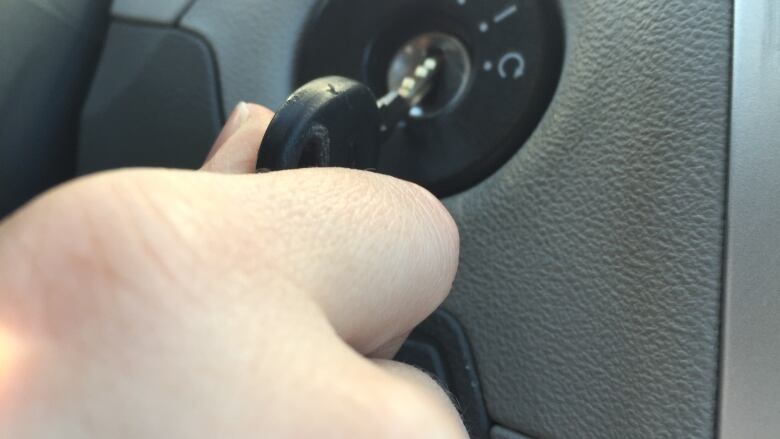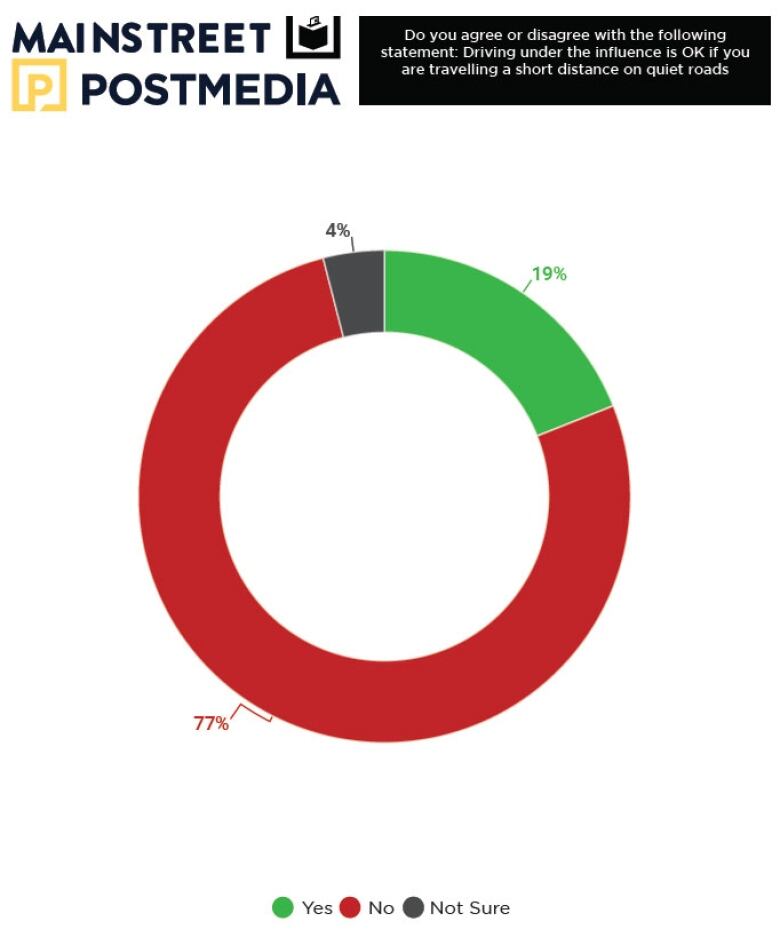Sask. doesn't see drunk driving as a problem 'until someone actually dies': MADD
New poll shows 1 in 5 OK with drinking and driving over short distances

A new poll byMainstreetResearchshows one in five Saskatchewan residents thinks it is OK to drink and then drive as long as it's only for a short distance on a quiet road.
That attitude is somewhat more prevalent among those between 18 and 34, according to the Aug. 22-23 Mainstreet/Postmedia poll.
Nineteen per cent said they're OK with driving under the influence under those circumstances, four per cent said they're not sure and 77 per cent said it's unacceptable.
The survey also asked people if they had driven under the influence (eight per cent said yes) or had been in the car with someone who had been drinking (15 per cent said they had).
According to David Valentin, executive vice-president of Mainstreet Research, the real number who accept drinking and driving over short distances may be even higher than the numbers indicate.
"It's important to remember however that there is a certain amount of social desirability bias," Valentin said.
"Sometimes respondents are not as truthful when answering these sorts of questions."
- 300+ drunk driving charges laid in July, triple last year's rate
- Great-grandfather of boy, 5, killed in Big River, Sask., blasts drunk drivers
A total of 1,690 people were interviewed for the poll.
It has a margin of error of plus or minus 2.38 per cent, 19 times out of 20.
MADDadvocate says Saskatchewan needs drastic changes
Wendell Waldron is a community leader withMothers Against Drinking andDriving in Regina.He moved from Ontario three years ago and joined MADD after he was hit by a drunk driver shortly after his move.
"It was just a scary thing. I got hit from behind and it just kind of brought things to light that it can happen to anyone. It doesn't matter how good of a driver you are," Waldron said.
When he moved here, Waldron said thecasual attitude towards drunk driving in the province surprised him, after living here a few years he said the recent poll results do not come as a shock.
"It's disappointing but it's not surprising."
"We don't view drinking and driving as a matter of consequence until someone actually dies," Waldronsaid.
Potential solutions:seizures, driving prohibitions and randomtests
Waldron said there are thingsthe government can do to deter drunk driving.
He said theprovince couldseizevehicles after a first offence. Asof now, impaired drivers must be caught a second time before losing their vehicle.
We don't view drinking anddrivingas a matter of consequence until someone actually dies,- Wendell Waldron - MADD Regina
As asecond step, Waldron suggestedtaking away driverslicenses fromimpaired drivers for a longer period of time.
Finally, he says the number ofpolice stop checks should be increased.
"The number one deterrent is not the laws, it isthe fear of being caught by a police officer, that is what's going to stop people from drinking and driving. The Regina police department last yearresponded to over 645 DUI incidents last year, which is an enormous number for a city this size."
"If you give them (police) the opportunity to do random sobriety stop checks the message will be clear and the drunk driving will stop to a certain degree," Waldron said.

Currently, Canada, the U.S. and U.K. have not adopted random breath testing. It has been in place for more than 30 years in France, Sweden and Finland. Australia adopted the practice in 1982 and saw a significant reduction in fatal crashes involving alcohol.Most developed countries have the test.
SGI CEO, 'disappointed' in poll results
While fatalities on Saskatchewan roads aredown to 122 in 2015, according to SGI, fatalities due to impaired driving accounted for nearly half of that amount.
"About 53 of those fatalities were due to drinking and drivingso about 43 per cent. It is the number one problem in terms of fatalities on Saskatchewan roads," saidAndrewCartmell,CEO of SGI.
"We need drivers in Saskatchewan to make a personalcommitment to not drink and drive. Driving attitudes and behaviours in this province really need to change and it needs to come from drivers themselves," saidAndrewCartmell,CEO of SGI.
Whenit comes to vehicle seizures after a first offence, Cartmell said SGIwould need to do some research to recommend a changeto the province.
Cartmell pointed toB.C. where there isa lower percentage of fatalities due to impaired driving than Saskatchewanabout 20 per cent according to SGI. In 2010, the province imposed a series of tough impaired driving laws, including immediate vehicle seizure.
In 2014,the government passedwidespreadchanges to Saskatchewan's road safety lawsto deter drinking anddriving.Cartmellsaid thegovernmentdoesn'ttypically consider changes until it hasat least five years of statistics to analyze.
68% do not support Don McMorris' return to office
This past May,Waldron presented SGI and SLGA with awards on behalf of MADD Canada. The minister responsible for the files, Don McMorris, was arrested and charged with impaired driving earlier this month.
"When I found out that he'd been arrested for impaired driving it was kind of a shot to the stomach,so to speak. It illustrates a point that we're not taking it seriously. If there's one person that shouldn't be arrested for [being]impaired it should be him," Waldron said.
In fact, one pollquestion looked at the impaired driving charge received by the former cabinet minister.
Asked if McMorris should run for office again after his charges are dealt with, 68 per cent of poll respondents said no.













_(720p).jpg)


 OFFICIAL HD MUSIC VIDEO.jpg)
.jpg)



























































































